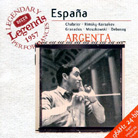 |
| July 15, 2004 The Unforgettable Argenta "Spanish
music" appears to have been for centuries a recognized category to which composers of
various nationalities enthusiastically contributed. Luigi Boccherini and Domenico
Scarlatti were Italians who actually lived in Spain for several productive years, and the
Frenchmen Edouard Lalo and Maurice Ravel may be said to have had the affinity through
their ancestry. Other Frenchmen -- and Poles and Russians and Viennese and Scandinavians
-- also composed "Spanish music," and many of them did so with remarkable
effectiveness, while the Spaniards themselves, of course, never neglected their musical
roots. One of the most treasurable recorded collections of Spanish music by non-Spanish
composers is the one left us by the Spanish conductor Ataúlfo Argenta, about whom a few
words may be in order before further comment on that recording. "Spanish
music" appears to have been for centuries a recognized category to which composers of
various nationalities enthusiastically contributed. Luigi Boccherini and Domenico
Scarlatti were Italians who actually lived in Spain for several productive years, and the
Frenchmen Edouard Lalo and Maurice Ravel may be said to have had the affinity through
their ancestry. Other Frenchmen -- and Poles and Russians and Viennese and Scandinavians
-- also composed "Spanish music," and many of them did so with remarkable
effectiveness, while the Spaniards themselves, of course, never neglected their musical
roots. One of the most treasurable recorded collections of Spanish music by non-Spanish
composers is the one left us by the Spanish conductor Ataúlfo Argenta, about whom a few
words may be in order before further comment on that recording.
Argenta (1913-1958) had a public career of only about a dozen years, during which he established himself initially in a series of recordings of zarzuelas and Spanish concert music recorded in Madrid and issued on various Decca labels. Among them was the LP that first made Joaquín Rodrigo’s Concierto de Aranjuez known throughout the world; Narciso Yepes was the guitar soloist. By the time he remade that title with Yepes in stereo a few years later, Argenta was recognized as the outstanding Spanish conductor of his time. He recorded for Decca with the Paris Conservatoire Orchestra and l’Orchestre de la Suisse Romande, whose revered founder, Ernest Ansermet, was apparently grooming him to be his successor on that podium. Decca even scheduled sessions in which Argenta was to record all four Brahms symphonies with the Vienna Philharmonic -- but he died in a bizarre accident (suffocating on exhaust fumes from his car in a closed garage) at the age of 44.
Perhaps Beecham and Ansermet matched Argenta in their recordings of the Chabrier piece, but no one has given us such a totally compelling and pervasively elegant account of Rimsky’s famous Capriccio, and the Moszkowski set is the sort of discovery that justifies any number of duplications of the more familiar items. How many of the tunes in these five dances are of genuine Spanish folk origin, and how many Moszkowski’s own, I do not pretend to know, but they are all exceptionally attractive, and the orchestration by Scharwenka identifies him as a true master of that particular craft. As far as I know, Argenta’s is the only recording of the complete set, and I can well imagine latter-day conductors feeling intimidated by it. In common with more than a few early stereophonic recordings, this one had some rough spots, which showed up more conspicuously on some systems than on others, and Decca had varying degrees of success with it in its several CD reissues. There were at least three of those before Classic Compact Disc brought out its pricey gold-spattered transfer (actually remastered by Decca itself), which was clear and away the best -- until five years ago, when Decca did yet another remastering for its own "Legends" series. For good measure, this CD is filled out with Argenta’s slightly later recording with the Orchestre de la Suisse Romande of Debussy’s Images pour orchestre, the triptych-within-a-triptych in which the familiar Ibéria is framed by the far less frequently heard Gigues and Rondes de printemps. The sum of these marvelous parts is not only an appropriate memorial to an exceptional conductor cut down on the threshold of a great career, but a particularly engaging entry in the long list of test/demo items from this label. (For such purposes, I favor tracks 8 and 11, Nos.1 and 4 of the Moszkowski dances.) While I really would buy Decca 466 378-2 for the Moszkowski alone, which happens to be an "only version," I don’t think anything on this CD is surpassed anywhere. After nearly 50 years, Argenta’s Rimsky still calls for first place among the dozens, or perhaps hundreds, of rival versions, and the Debussy should be downright revelatory for many listeners. And, unlike the two LPs brought together here, this mid-price CD is generously filled: it is as outstanding in respect to value-for-money as for its incomparable performances and its age-defying sound. ...Richard Freed
Ultra Audio is part of the SoundStage! Network. |
 One of Argenta’s very last recordings,
taped in Kingsway Hall in January 1957, was a collection headed España, with the
London Symphony Orchestra, which at just that time was exhibiting its new credentials as
one of the world’s outstanding performing ensembles. The LP wasn’t a
particularly generous one in respect to playing time, but everything on it was
exceptional. First came the famous Chabrier rhapsody that gave the collection its title.
Then Rimsky-Korsakov’s Capriccio espagnol, then a single genuinely Spanish
piece -- the fifth of Enrique Granados’s Spanish Dances, in the orchestration
by Juan Lamote de Grignon -- and finally all five of the Spanish Dances of Moritz
Moszkowski, in Philipp Scharwenka’s brilliant orchestral settings.
One of Argenta’s very last recordings,
taped in Kingsway Hall in January 1957, was a collection headed España, with the
London Symphony Orchestra, which at just that time was exhibiting its new credentials as
one of the world’s outstanding performing ensembles. The LP wasn’t a
particularly generous one in respect to playing time, but everything on it was
exceptional. First came the famous Chabrier rhapsody that gave the collection its title.
Then Rimsky-Korsakov’s Capriccio espagnol, then a single genuinely Spanish
piece -- the fifth of Enrique Granados’s Spanish Dances, in the orchestration
by Juan Lamote de Grignon -- and finally all five of the Spanish Dances of Moritz
Moszkowski, in Philipp Scharwenka’s brilliant orchestral settings.